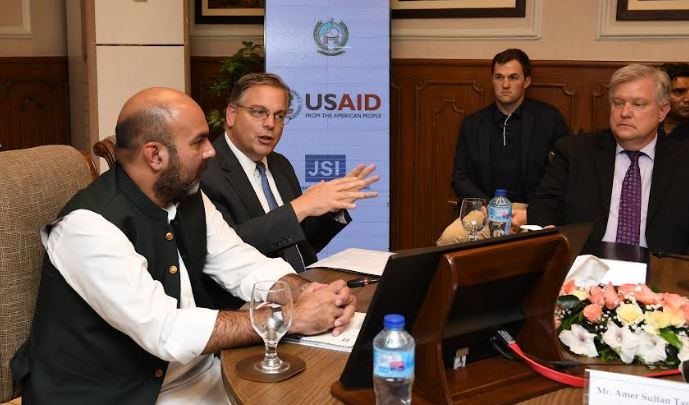Shamim Shahid
PESHAWAR: Through a donation of $130 million from the American people and in collaboration with the Government of Pakistan, the U.S. government completed the Gomal Zam Dam, which resulted in augmenting Pakistan’s energy capacity by 17 megawatts – enough capacity to power over 20,000 homes. The project at Gomal Zam Dam enabled local farmers in Dera Ismail Khan and Tank districts to successfully cultivate more than 191,000 acres of unproductive land by creating the region’s first reliable supply of water and doubling agricultural production in the area, creating economic opportunities for 30,000 households.
We constructed over 1,300 kilometers of roads including 652 kilometers of highways, 35 bridges, and two tunnels along the border region, the busiest of which caters to 16,000 vehicles every day. As a result, four major trade corridors between Pakistan and Afghanistan promote bilateral trade and regional economic integration. These roads have reduced the cost of travel and vehicle maintenance for the people of KP, fueled the construction of new businesses along the roadsides, and improved the delivery of social services for populations moving into the settled areas of the NMDs.
The U.S. government built an additional 1,240 kilometers of roads in the NMDs in crop control and border security projects to help farmers and businesses get goods to market. To date, we have also completed 1,300 regional water projects to provide drinking water, irrigation, and power to local communities.
The construction and renovation of 420 facilities for the police has helped increase rule of law in the province. The U.S. government has spent $2.6 million renovating 28 regular police stations into model police stations, including training on modern policing service-delivery practices and support for women.
Education
With the literacy rate in the newly merged districts at 33 percent overall and at only 12.7 percent among women, the U.S. government improved reading instruction for more than 600,000 children in KP by training over 14,000 teachers and distributed more than three million books for public use.
Our higher education programming has awarded more than 8,500 university scholarships and competitive grants to deserving yet financially disadvantaged Pakistani students who are pursuing careers in fields such as agriculture and business management that are vital to improving the economy.
The United States constructed 229 and rehabilitated more than 1,000 schools that were damaged due to militancy and natural disasters thus benefiting more than one million students.
2,800 people from KP participated in U.S. government-funded exchanges to the United States or educational programs in Pakistan and are now members of the Pakistan-U.S. Alumni Network (PUAN).
We have invested $1.3 million in public diplomacy grants for KP over the past six years to build capacity and train journalists, youth, entrepreneurs, and persons with disabilities. This includes an investment of $5.5 million in English language programs in KP.
Since 2012, a U.S. government grant has set up 21 KP universities partnerships with U.S. universities on various research projects and collaboration.
Since 2002, we have trained over 2,456 participants in investigative and forensic best practices under the Police Program. We have also trained 820 judges and prosecutors in judicial cooperation and information sharing.
Health
The United States rehabilitated more than 200 facilities, 120 kilometers of the municipal drainage system, and 180 drinking water wells in Peshawar, which resulted in providing access to basic drinking water, sanitation, and solid waste management services to more than 2,000,000 people.
We are delivering life-saving services for more than 340,000 women and children through multiple interventions in the region and have also trained more than 10,000 healthcare providers.
We provided equipment to 48 health units, donated medical equipment to six teaching hospitals, and supported the completion of a 120-bed Burns and Plastic Surgery Center in Peshawar to help protect the health of KP’s people.
Energy
As a result of the U.S. government partnership with the Pakistani government to launch a $127 million flagship initiative to establish centers for advanced learning in the areas of water, energy, and food security, these centers are now leading institutions across Pakistan and globally. For example, U.S.-Pakistan Center for Advanced Studies in Energy at the University of Engineering and Technology in Peshawar is now the technical lead on conducting feasibility and solarization for public colleges in the NMDs.
Governance
The U.S. government supported more than 130,000 women in remote areas to register and receive their national identity cards, which will include them in voters lists and give them benefits from various government support programs.
Humanitarian Assistance
Since 2008, the U.S. government has supported more than 2.2 million temporarily displaced persons by providing more than $338 million in humanitarian assistance in areas including agriculture, health and hygiene, food and water, security, shelter, and sanitation.
We also helped 1.9 million displaced people rebuild destroyed homes and resume their livelihoods in Pakistan.
Economic Growth
The U.S. government supported 3,000 women farmers by providing poultry packages and greenhouses in KP, contributing to their economic stability.
We contributed to the improvement of agriculture production of more than 220,000 hectares through improved irrigation networks, expanded horticulture value chains, and increased farmers’ access to markets.
U.S. Private Sector Investment
U.S. IT skills company Udacity signed a PKR 135 million ($600,000) contract with the Government of KP on June 29 to provide nano-degree skills training to graduates.
U.S. companies McDonald’s, Hardees, Subway, KFC, Ramada, Hilton, and Uber have operations in KP, employing thousands of local residents.
Launched this year, Coca Cola owns and operates a greenfield bottling plant at Hattar-Haripur area with an investment of $50 million.
Cultural Preservation and Restoration
The U.S. government has supported six Ambassadors Fund for Cultural Preservation projects in KP, investing more than $800,000 in cultural heritage preservation since 2002. This includes $600,000 to restore and conserve the Buddhist monastery at Takht-i-Bahi.

















